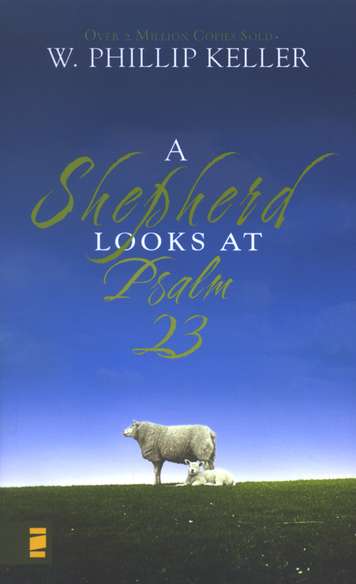
My Cup Runneth Over
by Michelle Bauman
One of my favorite devotional books, A Shepherd Looks at Psalm 23 by W. Phillip Keller, resides on the top shelf of the bookcase near my desk. I don’t remember how I came to own it, but based on its location, I know I must have received the book during our baby and toddler years—the years when all things precious needed to be placed high enough to protect them from chocolate-covered fingers, Nerf guns, and occasional wrestling matches.

The version I have isn’t Keller’s complete work. Rather, it’s a collection of excerpts from his original text transposed on and around pastoral paintings depicting sheep and the Good Shepherd. It is a beauty to behold.
More important than its physical beauty, though, are the invaluable observations Keller makes about the relationship between shepherd and sheep. His reflections shed light on how the Good Shepherd loves and provides for His sheep just as they unabashedly depict how utterly incapable sheep are of caring for themselves. When we recognize that we are those sheep, the implications provide a stark reality. Though we believe we are independent, capable beings, the truth is the opposite. We are completely dependent—in body and soul—on the good and gracious care of our Good Shepherd, Christ Himself.
The theme for this quarter’s LifeDate, The Lord Is Our Shepherd, gave me an excuse to pull Keller’s book off the top shelf again. As usual, I wasn’t disappointed, especially as I reread his musings on the phrase “My cup runneth over.”
Typically, when I think of an overflowing cup, I envision a cup filled with blessing. I picture a cup so full of goodness that it cascades down, spilling over in abundance. And that image reflects reality. God certainly provides cups of blessing for us. He not only gives us daily bread, but He often fills our pantries to bursting, offering us both variety and pleasure. His cup of blessing provides many other things we need as well: home and shelter, health and community, family and friends, and so much more. As Christians, we know that all good things come from God; they are gifts meant for our good and for the good of our neighbor.
But Keller points out that some cups aren’t filled with blessing; instead, some are filled with sorrow. Sometimes the cup placed in our hand runneth over with hardship; sometimes we drink from pools of suffering.
And that’s difficult to swallow.
It’s clear Jesus feels the same way. Matthew 26:39 records how Christ responds to the cup prepared for Him in the Garden of Gethsemane:
“And going a little farther he fell on his face and prayed, saying, ‘My Father, if it be possible, let this cup pass from me.’”
Jesus knows that the coming hours will be filled with hardship and pain; He knows He will be mocked, beaten, and whipped. More than that, Christ knows He will be tortured to death. It is a deep cup full of intense suffering, and Christ prays that He might not have to swallow it.
But that’s not where Christ’s prayer ends. His final words, hard as they may have been to speak, model for us how we are to approach suffering. “Nevertheless,” Jesus says, “not as I will, but as you will.” Christ submits to the suffering in store because through it those He loves might be saved; through it, He might redeem not only our lives but also our suffering.
This too is a difficult reality to embrace. We want to be self-sufficient; we want to believe that Christ would never give us more than we can handle. But we forget that as sheep, we really can’t handle anything on our own.
Like a sheep cast on its back, we are incapable of righting ourselves. We need a Savior to intervene on our behalf, One who will carry the weight of our worry and suffering on His shoulders. Christ didn’t die to prevent us from suffering, nor did He die to give us the power to handle it. He died to handle it for us. Washed in the blood of the sacrificial Lamb and wearing the clothes our Good Shepherd has dressed us in, our suffering is made holy in Christ.
Whether drinking from cups of blessing or sorrow, we are called to live as sheep, ever dependent on the mercies of our Good Shepherd. As we wait on His salvation, we rely on His promise to work through His Word, His Sacraments, and His people for our good, and we draw closer to Him.
